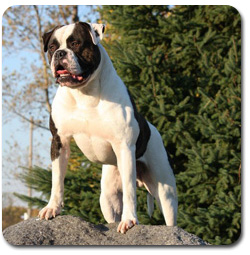
American Bulldog
Group: Guardian Dog Group
Origin: United States
Height:
- – Male: 22 to 27 inches
– Female: 20 to 25 inches
Weight:
- – Male: 75 to 125 pounds
– Female: 60 to 100 pounds
CLICK HERE to View Breeder Listings
Breed Profile
The American Bulldog was originally used to wrangle cattle on the American frontier. He originated in the USA during the 1700’s and was also used as a guard and fighting dog. He has remained a strong and versatile dog with characteristics found in the old English Bulldog. He is assertive, intelligent, bold and active.
All modern American Bulldogs originated from four strains — Williamson, Scott, Baily and Johnson. The best known lines are the Johnson and Scott types. Originally, Johnson dogs were more massive, with a larger, broader head and shorter muzzle as well as a distinct undershot bite. The Scott dogs were somewhat smaller in muscle and bone mass and had a less Mastiff-like head. Today, most American Bulldogs have crosses of the two types and are less distinguishable as being one type or the other.
The American Bulldog of today is an all-purpose working dog, fearless and steady, an excellent guard dog and loyal family companion. He should not be excessively timid, shy or aggressive. He is a brave and determined dog but not hostile. Because of his strong protective instincts, the American Bulldog needs to be well-socialized at a young age and obedience training is strongly recommended.
The American Bulldog should not be confused with other distinctly different breeds such as the American Staffordshire Terrier or the American Pit Bull Terrier.
In appearance, the muscular and well boned American Bulldog is a powerful, athletic short-coated dog. His head is large and broad with a wide muzzle. His colouring may be either solid, white with coloured patches, or brindle. The male American Bulldog is typically larger and more muscular than the female.
Health Issues
If you are considering the adoption of an American Bulldog puppy, or any breed, it is very important to be selective in choosing a responsible and reputable breeder. Ensure that the prospective puppy’s parents have all health clearances. Breeding of any dog should not be done until after they have been proven to be free of evidence of significant hereditary diseases. (For more information on selecting a breeder, see the articles on the General-Information page.)
Additional Health Resources:
- Hip Dysplasia
- Health and Nutrition — This section of the Canada’s Guide to Dogs website includes information on several health and nutrition related issues.
- Canine Health Information Center (CHIC) — Providing a source of health information for owners, breeders, and scientists that will assist in breeding healthy dogs. CHIC is a centralized canine health database jointly sponsored by the AKC/Canine Health Foundation (AKC/CHF) and the Orthopedic Foundation for Animals (OFA).
- AKC Canine Health Foundation — Working towards developing scientific advances in canine health.
- Orthopedic Foundation for Animals (OFA)
- Ontario Veterinary College (OVC)
- University of Pennsylvania Hip Improvement Program (PennHip)
- HealthGene — HealthGene Corporation is the leading provider of veterinary DNA diagnostic services in Canada.
- Labgenvet — Laboratory of Veterinary Genetics is a Canadian diagnostic laboratory that offers a comprehensive service of DNA tests for veterinary genetic diseases.
Breed Standards
Note: The American Bulldog breed is not recognized by the Canadian Kennel Club (CKC) or the American Kennel Club (AKC). However, the breed may be recognized by other registries not indicated here.
Grooming Information
- Grooming — This section of the Canada’s Guide to Dogs website includes tips, articles and information covering all aspects of dog grooming along with a listing of Groomers from across Canada.
Training Resources
- Training — For training information, see this section of the Canada’s Guide to Dogs website for tips, articles, as well as listings of training centres across Canada.
Additional Information
- Clubs, Sports & Activities — For information on the many sports and activities you can get involved in with your dog.
- Working Dogs — The Working Dogs section of the Canada’s Guide to Dogs website provides information and listings of organizations that are involved in various dog jobs, such as Guide Dogs, Therapy Dogs, Police Dogs, Protection Dogs, and much more.
Breed Listing
Quick Links
Get In Touch
- Email: canadasguidetodogs@gmail.com
- Email: info@canadasguidetodogs.com
- Visit us on Facebook: www.facebook.com/CanadasGuideToDogs
— CanadasGuideToDogs.com is an Amazon Associate as well as a participant in various affiliate programs, as such fees are earned from qualifying purchases.

